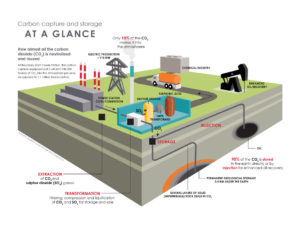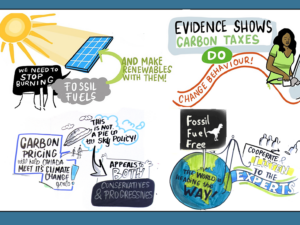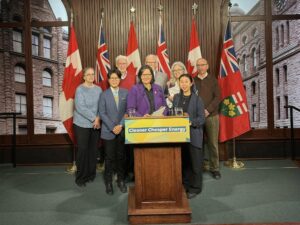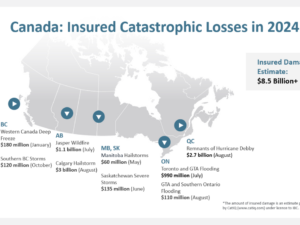(SUDBURY ON in Robinson-Huron Treaty Territory): Since 2017, I’ve been an observer at the Intergovernmental Panel on Climate Change (IPCC) 2017 plenary sessions , six United Nations climate conferences of the parties (COPs), and the 2022 United Nation biodiversity COP. I’m often asked, sometimes cynically, why do I attend? Observers aren’t just spectators – we spark transformation. In Dubai, United Arab Emirates (UAE), we gathered to face a critical moment: confronting the hottest year on record and bracing for an even hotter year ahead due to the complex interplay of an El Niño intensified by global heating gases and sulfur termination shock. COPs involve an intricate give-and-take between nations (referred to as parties) and non-governmental organizations. In total, 97,372 individuals registered for COP 28, including 3,972 media personnel and 14,338 observers from non-governmental organizations. Among these observers were nearly two dozen leaders from Citizens’ Climate Lobby (CCL)/International, representing countries including Burkina Faso, Côte d’Ivoire, Canada, France, Ghana, India, Japan, Mexico, Nigeria, Senegal, the United States, and Zambia. Our CCL network, rooted in democracy, champions citizen involvement—youth, indigenous groups, farmers, labor, women, and frontline communities—as crucial for effective climate policy. “Nothing about us without us” strongly resonates at COP, driving our focus on people-centric COP documents. And as observers, we ensure that all human rights are integrated into UNFCCC documents because a livable future is a human right. All of us passionately advocated for fossil fuel phase-out and the 1.5°C goal at COP. We specifically monitor financial pathways. Although UNFCCC lacks authority for global taxes, we closely track Paris Agreement’s Article 6.8, housing non-cap-and-trade mechanisms like Climate Income, a policy we’ve championed in Canada since 2010, enacted by our government in 2018. At COP 28 on December 2, 2023, Antigua and Barbuda, Barbados, France, Kenya, Spain, and the African Union Commission, with the European Commission as an observer, jointly launched a new taskforce on international taxation. The taskforce is the result of discussions initiated at the June 2023 Paris Summit for a New Financing Pact and the September 2023 African Climate Summit, held in Nairobi. The taskforce was announced with the goal to identify innovative finance mechanisms and mobilize new, additional, predictable and adequate financial resources for development, climate change and the protection of biodiversity. The taskforce will be supported by the European Climate Foundation. The COP experience offers unparalleled opportunities for continuous learning, relationship-building, and networking. Among the almost 100,000 people at COP 28 were 2,400 representatives and lobbyists from the fossil fuel sector, quadrupling the attendance compared to last year’s COP in Egypt, despite only a 2.5-fold increase in overall attendance this year, which is the root of a lot of the cynicism at the COP events. At COP 28, I engaged in a profound discussion over coffee with an oil lobbyist. This individual shared concerns about the politically-charged slogan “technology not taxes” in Canada. The crux? Fossil fuel pollution requires a $175 CAD price for carbon capture to be economically viable. Presently at $65 per tonne with citizen benefits, threats loom to dismantle this system during elections. This oil lobbyist urged better education on rebates, advocating for physical cheque distributions applicable across Canada, save British Columbia, Quebec and the territories where the federal carbon pricing system does not apply. The meeting ended with commitments to meet again in the future. COP 28 was historic but not a triumph. Most significantly, there was a confirmation that the transition needs to occur in the context of a 1.5C, which was a hard fought win by the vulnerable countries and the first-ever global recognition that fossil fuels must be relegated to history. Additionally, because the “need to transition away from fossil fuels” was mentioned in a COP document, countries are now required to report on the transition from fossil fuels in their national climate targets. Unfortunately, governments’ 2030 targets are poised to result in 2.5°C of warming by the end of the century: 0.1°C higher than last year. Problems persist, including weak targets by all countries, Indonesia’s coal expansion, ongoing reliance on unproven carbon capture and sequestration technologies, and problematic carbon offsets. Many pathways toward a livable future were paved at COP 28. Initiatives included the beginning of the operationalization of the Loss and Damage Fund, declarations on tripling renewables and doubling energy efficiency, and addressing the fossil fuel subsidy issue. Highlighting the role of agricultural systems and the effects of climate change on human health and the natural world, as well as the need for the transition to be just, were also positive signs of progress, demonstrating that COP conferences, while imperfect, are important and necessary. Contained within these pledges, declarations and statements lies a hopeful truth: that the transformation of the economy will not be linear. At COP 28, an art display captured why attending these COPs is essential: Hora: The Dance of Unity. Inspired by Neolithic sculpting techniques and Romanian heritage, it portrays a dance of 100 unique ceramic figurines in three circles surrounding a child. Hand-sculpted by artist Marius Diaconu, the piece symbolizes unity and hope, emphasizing that nothing can be achieved in isolation. COP 28 provided another opportunity to join in a dance of unity. And indeed, dance we must—for our governments to carefully manage a rapid, fair, and well-funded transition, and for the Global North to finally provide the financial and technical support necessary to make this energy transition unstoppable. The path forward is clear for all to see. Firstly, a global treaty is imperative to transition our economies away from fossil fuels. Secondly, whether it’s fossil fuels, farming, or forestry, all subsidies detrimental to our planet must end, polluters must be held accountable, and major banks, like the Royal Bank of Canada, the largest funder of fossil fuels, must align finances with the Paris Agreement. Reforms are also needed at multilateral development banks. These structural changes will redirect finances and mitigate greenhouse gas emissions. To fund all climate-related programs domestically and internationally, significant tax reform in Canada is essential. Post COP-28, G77, the largest block of developing countries at the COPs, declared that it is the lack of political will that is holding climate financing. That is our mission at Citizens’ Climate Lobby, to build the political will for a liveable world by empowering individual breakthroughs in personal power. We are specifically focused on carbon pricing and re-directing financial flows. Our collective safety relies on ensuring everyone’s well-being. Community is a key solution. The dance we partake in at the Conference of the Parties is a unifying dance—a dance of unity. For we cannot solve the myriad crises humanity faces in isolation. You can join us on the third Wednesday in January (January 17) to find out more about us and how we work. There are three convenient times to choose from. Go here to register. https://citizensclimate.earth/2023/12/20/ccis-get-to-know-us-calls/ To see a fuller description and list of many declarations and commitments at COP go here: https://canada.citizensclimatelobby.org/wp-content/uploads/2023/12/cop-28-media-packet.pdf #### The Dance of Unity at COP 28
MEDIA CONTACT: Cathy Orlando cathy@citizensclimate.org 705-929-4043
https://focus2030.org/COP28-assessment-of-commitments-to-climate-and-development-financing-global#
The Dance of Unity at COP 28
Home » CCL Canada News » The Dance of Unity at COP 28
FOR IMMEDIATE RELEASE: Tuesday, December 26, 2023













